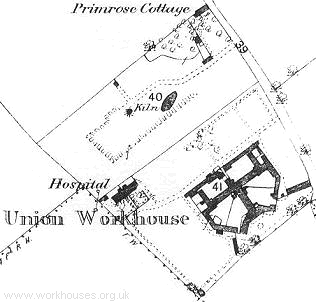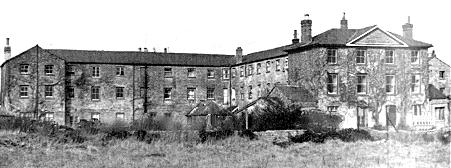Bicester, Oxfordshire
Up to 1834
The early workhouse directory An Account of Several Workhouses..., in a report from June 1725, noted that a Charity School was in operate in "Bisciter":
June 19, 1725.
Sir,
Last Summer I gave you an Account of the Trustees agreeing to employ the Children of the Charity-School at this Place, in some useful Labour besides their Learning. I am now to acquaint you with some further Proceedings in the same Affair.
A Gentleman in this Neighbourhood, who subscribes very largely to the School, declared that unless the Children were employ'd in some Sort of Work, to accustom them to Labour, be would withdraw his Subscription.
Upon hearing of this, the Treasurer called a Meeting of the Trustees, and reported the Matter to them, and after Debate, it was agreed, the Children should be employ'd in spinning Jersey. A Woollen Garter-Weaver in the Town was sent for, and he agreed to supply them with Work; a Person is fixed on to learn them to spin; Utensils are bought, and they have just now made a Beginning.
It is propos'd, that they shall work only the School Hours, and six Boys to work one Day in a Week, and the next Day six others, and so on.
A workhouse was set up in Bicester in the mid 1700s. A parliamentary report of 1777 recorded a parish workhouse in operation at Bicester Market End for up to 40 inmates. In 1782, inmates were employed in spinning wool, jersey, and coarse linen. In 1809, operation of the workhouse was contracted out to Henry Chandler, a plumber and glazier. He resided in the workhouse and received a salary of £3.10s. per week for up to 20 inmates, plus 3s.6d a week for each pauper above 20. He supplied the inmates with food, clothing, and also received income from their work. He also taught the children to read.
The Speenhamland system was in use in Bicester, with labourers' wages being made up by the parish on a scale that was determined by the current price of bread. By 1820, the high price of bread following the end of the Napoleonic Wars, and the introduction of the Corn Laws, had pushed the poor rates to very high levels. Able-bodied claimants for poor relief were sent around local rate-payers in the hope that they would provide them with work, a practice known as the "roundsman system". The "work" provided for such men was often non-productive such as digging holes then filling them in again. In 1821, Sir Gregory O Page-Turner offered to provide work for any unemployed pauper labourers in his stone quarry and brickfield at Blackthorn — a scheme which reduced the poor rate by half. This was not a popular measure and eventually, in December 1827, resulted in a riot by labourers in the town.
In 1830 and 1831, the town reverted to the farming of the poor but this proved very expensive and was dropped. In 1830, a free emigration scheme to the USA was organised by the Bicester Emigration Committee. The sum of £1,000 was borrowed to fund the project and in May 1830, 71 adults and 40 children set out in wagons to Liverpool. However, some of the prospective emigrants got cold feet and made their way back to Bicester, where they again became a burden on parish which set them to work fetching coal from Heyford Wharf.
After 1834
Bicester Poor Law Union was formed on 1st August 1835. Its operation was overseen by an elected Board of Guardians, 40 in number, representing its 38 constituent parishes as listed below (figures in brackets indicate numbers of Guardians if more than one):
Oxfordshire:
Ambrosden, Ardley, Arncott, Bicester King's End, Bicester Market End (3), Blackthorn, Blechingdon, Bucknell, Charlton, Chesterton, Cottesford, Fencott and Moorcott, Fringford, Fritwell, Goddington, Hardwicke, Hethe, Islip, Kirtlington, Launton, Lower Heyford, Merton, Middleton Stoney, Newton Purcell, Noke, Oddington, Piddington, Shelswell, Somerton, Shouldern, Stoke Lyne, Stratton Audley, Tusmore, Upper Heyford, Wendlesbury, Weston on the Green.
Later Additions: Finmere (from 1895), Finstock (from 1895),
Mixbury (from 1895)
Buckinghamshire:
Boarstall, Caversfield.
The population falling within the union at the 1831 census had been 14,850 with parishes ranging in size from Tusmore (population 16) to Bicester itself (2868 for the two Bicester parishes combined). The average annual poor-rate expenditure for the period 1832-35 had been £15,327 or £1.Os.7d. per head of the population.
The new Board of Guardians had their first meeting at the Black Boy Inn in Bicester Market Square in August 1835. The new workhouse was built 1836 to a design by John Plowman whose plans had been preferred to those of his rivals George Wilkinson and George Gilbert Scott. It was constructed at the north-west of Bicester at a place known as Highfield, on a site between the Middleton and Caversfield Roads and opened in October 1836. It was designed to accommodate 350 inmates and cost a total of £4,640 of which £500 was for the land and £3,300 for the building contract. During its construction, some Board members complained that that the planned board-room was too small. This was remedied by reducing the size of the waiting room and extending the boardroom.
The general layout of the site can be seen on the 1882 map below.

Bicester workhouse site, 1882.
To the west of the main workhouse building was a hospital which later became an isolation hospital.
Bicester was one of the workhouses visited undercover in the 1920s by former Oxford MP and newspaper proprietor Frank Gray who disguised himself as a tramp. The Guardians at Bicester, which was then the centre of hunting country, wanted to close the workhouse because there was so little use for it. Gray's experience of Bicester was recorded as follows:
Porter: What are you doing here?
Gray: I want the casual ward.
Porter: It's closed; it's been closed a long while. Haven't you been told?
Gray: I saw a notice at Oxford that Northleach was closed.
Porter: Northleach has been closed for years and this is closed.
Gray: Ought I to go to the police station and ask where I can sleep?
Porter: Go to a thousand police if you like. If you come in here to-night you won't get out. There's a whole day's stone-breaking here for your kind.
Gray: I ain't afraid of work if I can come in.
Porter: It's nowhere near six; go round there and wait.
I move on and he shouts after me: "The door's open. You can go in now if you like."
I go into a room. It is just light enough to see that it is furnished with a form, a desk, and a cupboard. After I have been searched and questioned — all done strictly and properly — three other "tramps" arrive at intervals. Each had precisely the same reception at the hands of the porter (the attempt to drive them away) as I had had, yet I entirely exonerate the porter from any unkindness or improper conduct. Indeed, of all the officials I met on my tramp I have singled him out for a letter of grateful thanks and a memento of our meeting. Why? Because I believe this paid underling is carrying out a policy under instructions. I believe that policy is in operation with the object of securing evidence that the casual ward is so little used that it can be closed.
After my bath and in my workhouse shirt I go into the dormitory, and I find "Bill," whom I met at Thame and Headington. I say to him: "You —, you told me this 'spike' was all right." "Well," he replies, "ain't I doing me —— punishment for believing it? I shall be out to-morrow at nine o'clock. The —— keep you two nights here."
On the morrow after my first night in the Bicester workhouse I am locked in the casual ward for a day, and my task is to clean three rooms, for the porter has put "the bloke who is a cut above the game" on the lighter task. He advises me in a whisper not to do it all in the morning, or time will hang heavy. He comes to me during the morning and advises me to communicate with my friends. I tell him I am going to friends beyond Chipping Norton. He tells me to tell the porter at Chipping Norton that he (the porter at Bicester) wants me looked after. He says: "You'11 find him a very decent fellow." This porter said I was a cut above my job. I retort that he is a cut above his.
Midday, during my confinement at Bicester, I get two potatoes as well as bread. What a treat!
The Bicester Board of Guardians was finally disbanded in 1939. When the workhouse closed down, it became for a while the Frank Gray Home for Boys, an institution aimed at saving the impoverished young from a drifting into a life on the road.
After the Second World War, the workhouse building was converted into flats and became known as Market End House. The building was demolished in 1968, after a brief period of use by the county fire brigade for training crews in performing rescues from smoke-filled buildings.

Bicester Workhouse
Courtesy of Newsquest (Oxfordshire) Ltd.
The residential road Market End Way now stands on the former workhouse site.
Staff
Inmates
Records
Note: many repositories impose a closure period of up to 100 years for records identifying individuals. Before travelling a long distance, always check that the records you want to consult will be available.
- Oxfordshire History Centre, St Luke's Church, Temple Road, Cowley, Oxford OX4 2EX. Outdoor relief lists (1838-1909); Guardians' minute books (1835-1928); General correspondence (1836-1911); Many documents relating to Bletchingdon; etc.
Bibliography
- Gray, Frank (1931) The Tramp: His Meaning and Being JM Dent.
- Richmond, Carol (2007) Bicester Poor Law Union and Workhouse Records 1834-1851 (Oxfordshire Black Sheep Publications). 70 pages, fully name indexed and includes staff register, admissions register 1834-36, application and report book, medical cases, pauper relief 1837-1851, applications for emigration, pauper lunatics and idiots. Available from Oxfordshire FHS.
Links
- None.
Unless otherwise indicated, this page () is copyright Peter Higginbotham. Contents may not be reproduced without permission.


